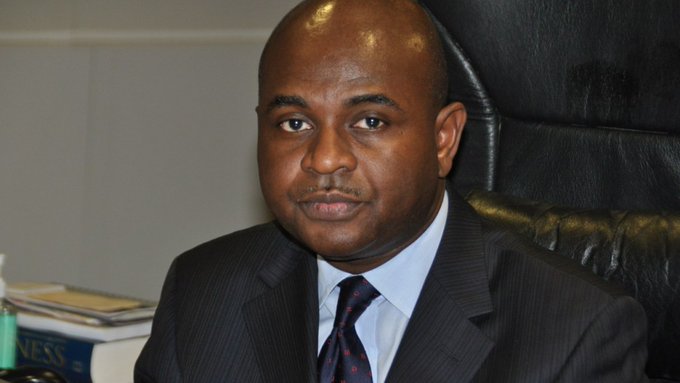At a time he nation’s economy is set for a second recession in four years, crude oil is selling even below the revised $30 per barrel benchmark already, and in the absence of savings for the rainy day, former candidate in the 2019 Presidential election, Prof. Kingsley Muoghalu, on Sunday called for a cocktail of measures to mitigate the harsh impact of the Coronavirus pandemic on the Nigerian economy.
While urging the Federal Government to immediately cancel, rather than suspend its “plan to borrow $22.7 from foreign countries (mainly China) for “infrastructure” completely, he urged the Central Bank of Nigeria (CBN) to “strategically and proactively devalue” the Naira.
Muoghalu, a former CBN deputy governor in a statement he signed personally, called for “urgent fiscal reforms immediately after the coronavirus crisis,” warning that “the Nigerian government will likely not be able to service (let alone repay) such debt in the next few years.
“Our economy must become truly diversified away from crude oil. The petrol subsidy needs to be removed and the fuel pump price deregulated, with savings from subsidy removal invested urgently in the health and education sectors,” he added.
For him, there is also a need for “foreign exchange reforms that truly incentivize a shift away from oil-dependency through increased manufacturing and export trade remain urgently needed.”
The Naira devaluation, he argued, should be “aligned with appropriate fiscal and trade policy rather than, as is often the case, having devaluations forced on Nigerians with no accompanying policy reforms.”
In addition, he continued, he wants the CBN to scrap its forex-access restrictions on the importation of over 40 items, and instead, the Federal Government should “impose high tariffs on items perceived as “luxury” or non-essential (and generate revenues from such tariffs).
Also, he expects industrial and trade policy to “establish subsidies and other incentives for domestic manufacturers, especially those that can provide proof of export orders that will bring in hard currency and take advantage of the naira devaluation in the international market.
“If this approach is adopted, Nigeria will progressively wean itself from crude-oil revenue dependency. This is how a structural transformation of the Nigerian economy can happen. Political will, policy shifts, and transparently administered market incentives, not rhetoric, are essential to achieve this goal.
The Covid-19, he according to Muoghalu, who is also convener, To Build a Nation (TBAN), nonetheless “presents a difficult and challenging time for the world and our country Nigeria. This crisis has security, social and economic dimensions, and we must now and in its aftermath fundamentally re-examine our patterns of thinking, acting, citizenship and leadership, and how this all translates into governance.”
Apart from the absence of healthcare infrastructure to handle large numbers of coronavirus patients should this become the case –as is likely, he lamented the unique challenge posed by widespread poverty. This, for him, is “reflected in the large crowds of the urban poor in commercial cities such as Lagos, Kano, Onitsha, and Aba, congested into tight spaces and seemingly oblivious to the requirement for social distance as they engage in their daily “hustle” for subsistence. This imperative of poverty is the greatest immediate threat to curtailing the spread of Covid-19 in Nigeria.
In addition to measures already taken by the federal and state governments, he called for a shutdown of the entire country for one month to be enforced the Police and, if necessary, the Army, barring only existentially essential services.
This, he stressed, is necessary to allow for contact tracing, reduce community spread of the disease, especially in urban slums and rural areas, import and deploy testing kits, and to deal with emergency treatments while it can still conceivably be handled.
Tackling the loss of livelihood for the already poor and vulnerable people arising from the shutdown, Muoghalu continued, is the real challenge posed by the nation’s lack of financial savings and a real fund for the rainy day.
As a way out, he says Nigeria is now in a war situation with an invisible enemy, following which the federal and state budgets for 2020 should be completely dedicated to tackling effects of the Covid-19 in pandemic this year, with the exception of security and payment of salaries.
Even “the N50bn fund established by the Central Bank of Nigeria for families and small businesses will not be adequate to address the crisis if and when it escalates,” he added, calling on the Federal Government to provide subsistence funding of the estimated 100m extremely poor Nigerians for 30 days.
This too, he continued, does not however, come cheap, noting that “in a back-of-the-envelope calculation, if a sum of N20,000 were to be made available for every impoverished family to stock on food and supplies for a month in a Covid-19 total shutdown scenario, this would require intervention of N2tr!
“Even the N10tr federal government budget for 2020 may not be able to carry this burden since it is based on projections that have turned out (as usual) to be unrealistic because of reliance on crude oil revenue and the absence of a broad base of domestic taxation. This would be possible, however, if the burden were to be split with state governments. Additionally, members of the National Assembly should donate 50% of their emoluments to this effort.”
Trending Today
Menu








